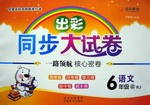题目内容
阅读理解。
Peter: There's a new library in our school. Let's go and have a look.
Millie: Great! Let's go.
Peter: Let's put our bags here.
Millie: Why?
Peter: Look at the sign: "You can't bring your bag into the library."
Millie: I see. Can we read books here?
Peter: Yes, we can. There are many desks and chairs in the reading room. We can sit down and read
books.
Millie: Can we borrow the books?
Peter: Yes, we can. But we can only keep (保留) the books for a week.
Millie: Can we bring these newspapers home?
Peter: No, we can't. We must read the newspapers here.
Millie: Can we…
Peter: Shhh. Don't speak. Look at the sign. It says "Don't talk in the library."
Millie: OK. Let's read our books.
Millie: Great! Let's go.
Peter: Let's put our bags here.
Millie: Why?
Peter: Look at the sign: "You can't bring your bag into the library."
Millie: I see. Can we read books here?
Peter: Yes, we can. There are many desks and chairs in the reading room. We can sit down and read
books.
Millie: Can we borrow the books?
Peter: Yes, we can. But we can only keep (保留) the books for a week.
Millie: Can we bring these newspapers home?
Peter: No, we can't. We must read the newspapers here.
Millie: Can we…
Peter: Shhh. Don't speak. Look at the sign. It says "Don't talk in the library."
Millie: OK. Let's read our books.
1. Millie goes to the _____ with Peter.
A. library
B. park
C. supermarket
D. computer room
B. park
C. supermarket
D. computer room
2. Students can't bring their _____ into the library.
A. footballs
B. rulers
C. pens
D. bags
B. rulers
C. pens
D. bags
3. In the library, Peter and Millie can read books _____.
A. at home
B. in the classroom
C. in the reading room
D. in the art room
B. in the classroom
C. in the reading room
D. in the art room
4. —How long can they keep the books?
— _____.
A. One day
B. A week
C. Five days
D. Two weeks
B. A week
C. Five days
D. Two weeks
5. They can't take the _____ home.
A. newspapers
B. books
C. paper
D. bags
B. books
C. paper
D. bags
ADCBA

练习册系列答案
 出彩同步大试卷系列答案
出彩同步大试卷系列答案
相关题目